
5 minute read
Studies show staffing shortages, pressures remain in eldercare, including for administrators
Research is bearing out that considerable staffing challenges continue for eldercare systems and facilities, and this includes when it comes to top leadership at those organizations.
shifts in the eldercare job market also are due to job candidates having many choices, with the same skill sets prized in many settings. Many job seekers are opting for gig economy work, he adds. Sr. Di Maria notes many also want a better work-life balance, remote work and reduced hours — perks often unavailable in long-term care administrator roles.
Laura Campbell, Benedictine senior vice president for people development, says given such pressures, there is a “shrinking market” of candidates, including for these positions. She says candidates qualified to apply for such positions are heavily recruited.
Kathleen Murray, Benedictine director of workforce solutions, adds that the pipeline issues are compounded because of recent shifts in eldercare: Since such organizations are adding assisted living options to campuses, administrators must be certified to run not only nursing homes but also assisted living sites. Benedictine has more than 30 communities across Illinois, Minnesota, Missouri, North Dakota and Wisconsin.
Allison Q. Salopeck, president and chief executive of Jennings, says anticipating vacancies in administrator roles “is a topic we always have to pay attention to.” Jennings has four campuses in Ohio.

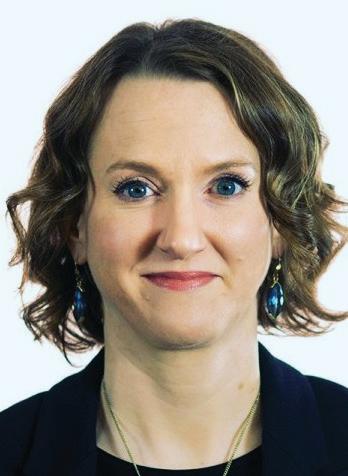
Leader cultivation
Especially given the dynamics of the eldercare job market, Law says it is ideal to build the pipeline to the top administrator positions from within an organization.
Salopeck agrees. She says: “We need to always ensure we’re cultivating the type of leadership in our organizations” that will build a solid pool of people who have a love of serving elders, alignment with the Catholic health mission and the capability to guide the organization in achieving that mission.
To do this at Trinity Health Senior Communities, Law says that organization focuses on understanding what it is about the culture that makes people want to stay and then investing in and bolstering those areas. The organization also pays constant attention to succession planning. And it remains in communication with all staff about their job satisfaction, so it can quickly identify issues that could spark an exodus. It addresses problem areas right away, Law says.
All the ministry eldercare leaders who spoke to Catholic Health World say their organizations are very intentional about keeping an eye out for mission-minded staff with leadership potential. The organizations have — or are in the process of developing — formal programs to help those staff build up leadership capabilities so they can advance if they wish to. The programs include formation in the organizations’ spiritual heritage. Jennings’ program is “Reach”; Trinity Health Senior Communities, “Emerge”; and the Carmelites, “Roots of Caring.”
Many of these organizations also have developed mentorship programs to give budding executives support.
LeadingAge offers multiple programs for people aspiring to executive positions in eldercare. It is developing a fellowship to increase diversity in eldercare administration.
Selling eldercare
The eldercare organizations also work to develop the external pipeline, including by countering misconceptions about working in eldercare and building awareness of the positives of a career in that field. LeadingAge’s Kellerman says such education of the public is needed because longterm care is not generally seen as an on-theradar, highly desirable career path, in part because of U.S. society’s focus on youth over old age.
Salopeck says Jennings has established programming to expose students from high school up to the many types of job opportunities at continuum-of-care sites.
She notes that Jennings is fortunate to be in a state where multiple top universities have developed curriculum and programming around long-term care career preparation. Jennings takes part in internship and administrator-in-training partnerships with the universities. Those programs have steered multiple people with an interest in eldercare administration to Jennings. Other executives say their systems have forged similarly effective educational partnerships. Some say they are looking to expand the partnerships significantly.
Law says beyond those educational partnerships, Trinity Health Senior Communities is working on other ways of building awareness of and interest in ministry eldercare roles. The organization is attuned to how it and its leadership are interacting with the community.
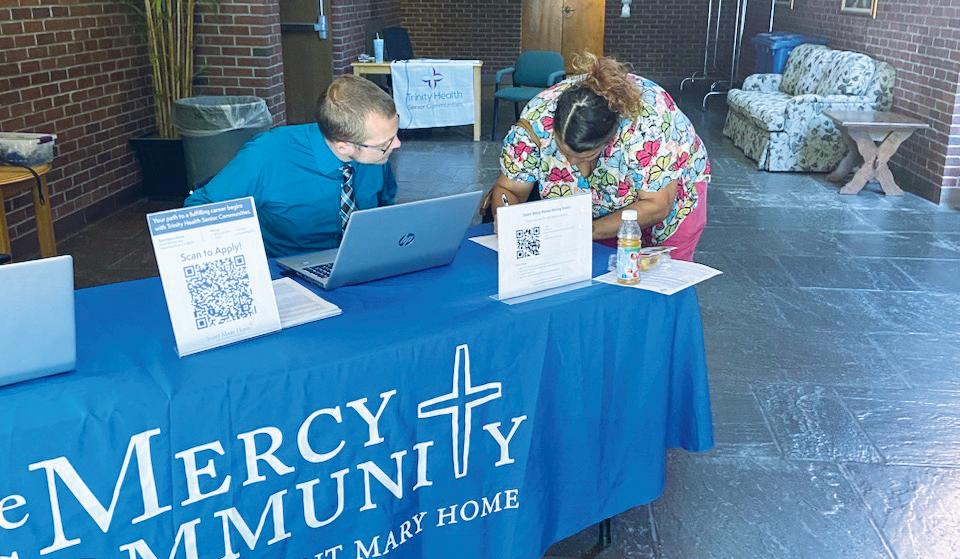
“We don’t just sit back, we need to be constantly innovating our processes,” Law says. “This includes projecting our values and culture to the market and making sure we have a strong employment brand.”
He says the organization uses its mar- keting and social media to tell the stories of the important work that goes on at Trinity Health Senior Communities. It also encourages employees and executives to be ambassadors for the system’s sites. Those relationships between the informal ambassadors and people in the community can be leveraged to attract candidates into the pipeline to top positions.
According to a poll the LeadingAge nonprofit conducted among its membership of eldercare sites in February and March, 64% of the nearly 900 respondents said the workforce crisis had not improved since LeadingAge last queried on the subject in June 2022.
That same poll found 92% of nursing home respondents and nearly 70% of assisted living respondents report significant or severe workforce shortages.
In the poll 78% of respondents said staff were leaving eldercare for better pay; 53% said they were leaving for better schedules; and 73% said staff were leaving because of burnout.
An analysis of Bureau of Labor Statistics data by the American Health Care Association and National Center for Assisted Living showed that nursing homes have lost 210,000 employees over the course of the pandemic. The AHCA/NCAL released this analysis in January.
In that reporting, AHCA/NCAL said that at the current rate of hiring, nursing homes would not return to pre-pandemic staffing levels until 2027.
McKnights Long-Term Care News found in its 2022 Mood of the Market survey that about 52% of long-term care facility administrators had considered leaving their jobs in the three months prior to the survey.
According to March 2022 reporting in Skilled Nursing News, in a survey the publication conducted, 58.6% of respondents said they expected the administrator hiring climate to get harder. About 32.5% of respondents said hiring administrators has been increasingly challenging because there are not enough qualified applicants. The total respondent count for the survey was 116 operators of small, midsized and large nursing homes.
In the same survey, 65.2% of respondents said they expected administrator retention to get harder. More than 48% of those surveyed said retention had gotten harder due to pandemic-related burnout and current operating challenges.
Murray too says it’s vital that people outside the organization know the powerful work going on inside facility doors. “Our faith-based work is definitely a selling point for us,” she says. “People join and stay for the right reasons and it’s a beautiful culture and people do purpose-driven work here.”
Sr. Di Maria says if more people were aware of the life-changing vocations available to them in long-term care, “they’d be banging down the doors to work here.” jminda@chausa.org
PRESIDENTS/CEOS
Jonathan Brouk to president of Our Lady of the Lake Children’s Health in Baton Rouge, Louisiana, from interim president. The facility is part of Franciscan Missionaries of Our Lady Health System.
Eric Young, chief operating officer of Bon Secours Memorial Regional Medical Center, to interim president of Bon Secours Memorial Regional Medical Center in Mechanicsville, Virginia, and Rappahannock General Hospital in Kilmarnock, Virginia. He replaces Leigh Sewell, who has departed as president.
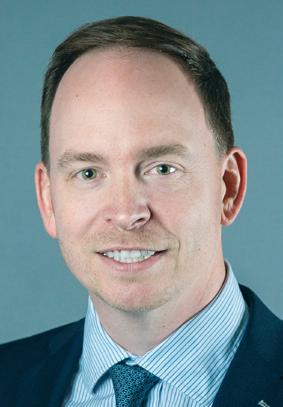
Administrative Changes
Veronica Scott-Fulton to chief nurse executive of Bon Secours Mercy Health.
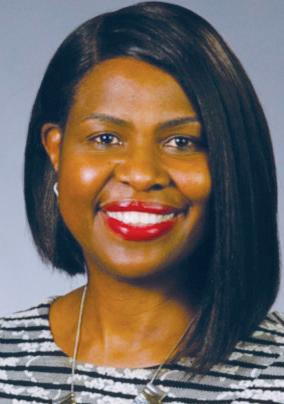
Sheri Shapiro to CommonSpirit Health senior executive vice president and chief strategy officer.
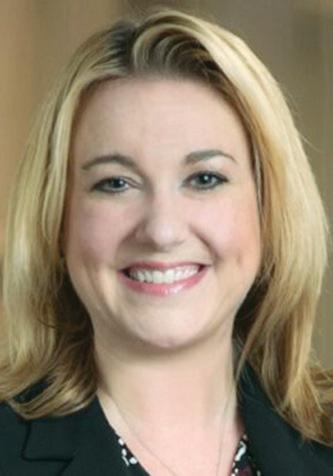
Organizations within CHRISTUS Health have made these changes: Anna Gore to chief nursing officer of CHRISTUS Santa Rosa Hospital — San Marcos in Texas; and David Karchut to vice president of mission integration at CHRISTUS St. Michael Health System in Texarkana, Texas.
Tracey Smithson to chief nursing officer for St. Dominic Hospital of Jackson, Mississippi, part of Franciscan Missionaries of Our Lady Health System.
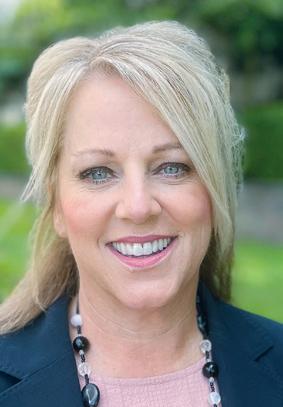
Honor
The American Society of Business Publications Editors’ ASBPE Educational Foundation has honored Health Progress, CHA’s journal, with its Journalism That








